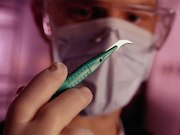About one-third of surgeon variation explained by patient volume, surgeon attitudes to genetic testing
WEDNESDAY, July 11, 2018 (HealthDay News) — The attending surgeon is associated with variation in the receipt of genetic testing after breast cancer diagnosis, according to a study published online July 3 in JAMA Surgery.
Steven J. Katz, M.D., M.P.H., from the University of Michigan Medical School in Ann Arbor, and colleagues examined the correlation of attending surgeon with variation in receipt of genetic testing in a population-based study involving 7,810 women diagnosed with stages 0 to II breast cancer. A total of 5,080 of 7,303 eligible women and 377 of 488 surgeons responded to surveys.
The researchers found that 34.5 percent of patients had an elevated risk of mutation carriage and 27.0 percent underwent genetic testing. There was a more than two-fold increase in the odds of a patient receiving genetic testing if she saw a surgeon with an approach one standard deviation above that of a surgeon with the mean test rate (odds ratio, 2.48). Patient volume and surgeon attitudes about genetic counseling and testing accounted for 34.1 percent of the surgeon variation. If a patient with higher pretest risk saw a surgeon at the fifth and the 95th percentile of surgeon distribution, the probability of testing would be 26.3 and 72.3 percent, respectively.
“In this study, the attending surgeon was associated with the receipt of genetic testing after a breast cancer diagnosis,” the authors write. “Variation in surgeon attitudes about genetic testing and counseling may explain a substantial amount of this association.”
One author disclosed financial ties to Myriad Genetics.
Copyright © 2018 HealthDay. All rights reserved.








